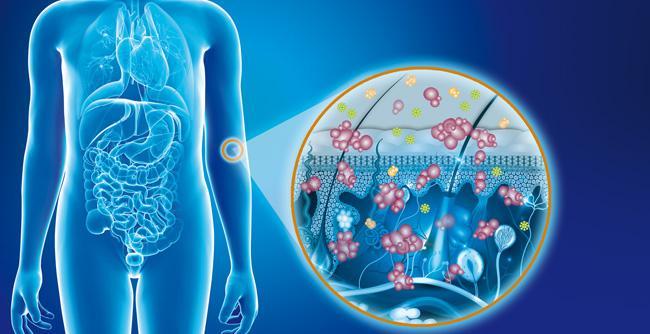One of the current areas of research into probiotics relates to oncology and especially immunotherapy.1 We now know that the effectiveness of immunotherapy is affected by the profile of the patient’s intestinal flora.
This offers immense opportunities for enhancing our knowledge of the link between an individual’s intestinal microbiota and the effectiveness of a given therapy.
Another area of research focuses on the chances of curing certain diseases by changing the intestinal flora. It has already been shown that the intestinal microbiota has an impact on some pathologies, including obesity, autism, metabolic syndrome, atopic dermatitis, diabetes, and chronic inflammatory bowel diseases (CIBD).
A lot of research remains to be done before we understand the links between intestinal dysbiosis and these pathologies, and the potential benefit that probiotics could bring to this area. Nevertheless, even now animal experiments have shown that some of these illnesses can be cured by modifying the intestinal flora.
The studies also cover the cutaneous microbiota
In the same way that dysbiosis in the digestive tract may lead to intestinal pathologies, and also to obesity and metabolism problems, a cutaneous dysbiosis may cause the development of dermatological pathologies such as acne or atopic dermatitis.
Lastly, other microbiota are starting to be studied, such as those of the eyeball or the lungs.

1. Immunotherapy : treatment that does not act directly on the cancerous cells but targets the host’s immune system to combat such cells.
Sources :
- Dossier de presse INRA (2017) Microbiote, la révolution intestinale (http://presse.inra.fr/Dossiers-de-presse/Microbiote-la-revolution-intestinale).
- Microbiote intestinal, un organe vital à découvrir (2015) CREGG (Club de réflexion des cabinets et groupes d’hépato-gastroentérologie) (www.cregg.org/site/images/forums-2015/forum-nutrition/05-14h50-BG-B-V2.pdf).
- Gabriel Perlemuter, Anne-Marie Cassard (2016) Les bactéries, des amies qui vous veulent du bien. Editions Solar.
- C Landman, E Quévrain. Le microbiote intestinal : description, rôle et implication physiopathologique. La Revue de médecine interne (2016) 37 : 418-423 (http://acces.ens-lyon.fr/acces/thematiques/immunite-et-vaccination/thematiques/virus-et-immunite/utiles-microbiote/pdf/1-s2.0-S0248866315011273-main.pdf).
- Di Domizio et al (2016) Le microbiote cutané : le poids lourd sort de l’ombre Rev Med Suisse ; 12 : 660-4. (https://www.revmed.ch/RMS/2016/RMS-N-512/Le-microbiote-cutane-le-poids-lourd-sort-de-l-ombre)
- M.-C. Ploton et al. Le microbiote pulmonaire (2017). Archives de Pédiatrie Volume 24 – N° 7, juillet 2017, Pages 667-674.
